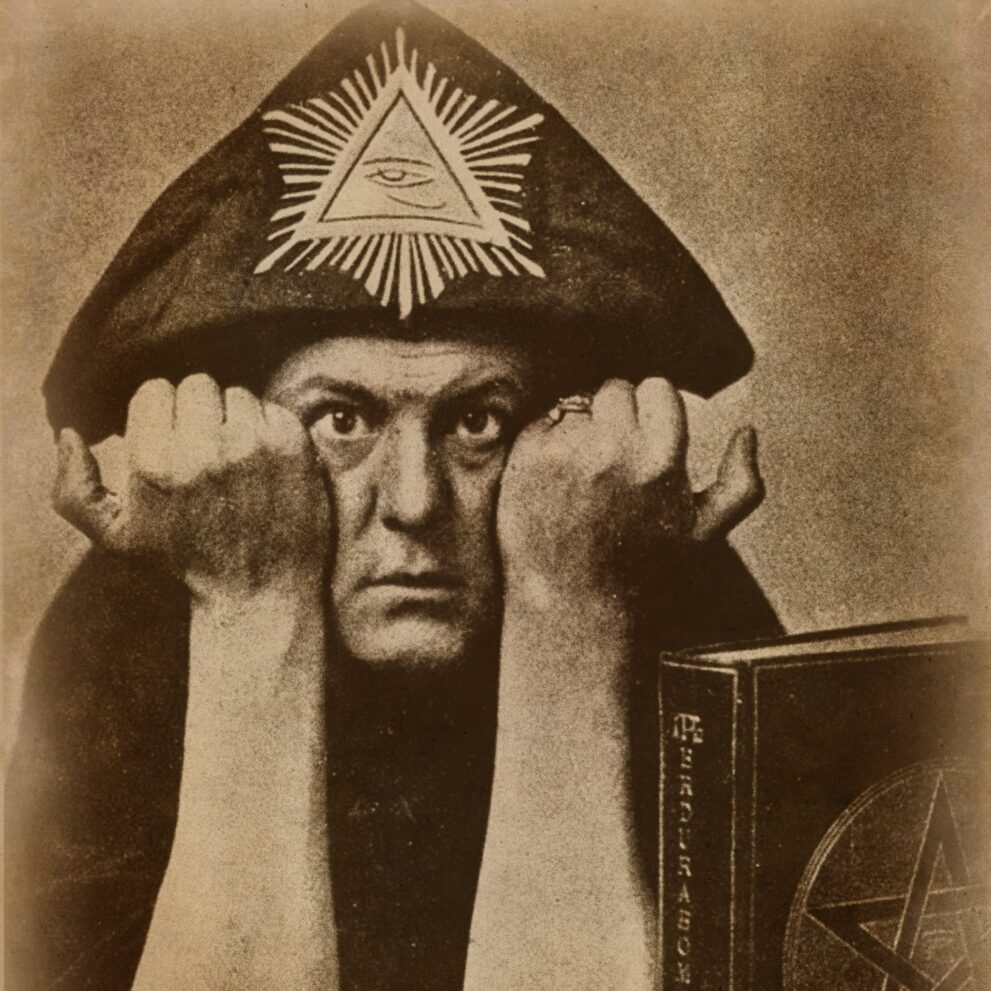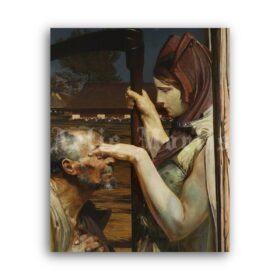Aleister Crowley, a multifaceted individual who dabbled in the occult, engaged in mountaineering, expressed himself via poetry, caused disruptions, operated as a spy, and incited provocative actions, is widely acknowledged as a highly intriguing personality of the twentieth century. His existence appeared to be a constant source of defiance against established norms, societal expectations, and occasionally, even his own personal beliefs.
Occultism
In the beginning, Edward Alexander Crowley, a youthful individual from England, harbored aspirations of pursuing a career as a diplomat and dedicated his academic pursuits to the study of philosophy at the esteemed institution of Cambridge. Nevertheless, his fascination with the occult sciences quickly intensified, prompting him to adopt a more exotic Gallic variant of his original name, Alexander, namely Alistair. Consequently, he made the decision to discontinue his studies at a renowned institution and wholeheartedly dedicate himself to the pursuit of esoteric knowledge. Throughout different periods, he had membership in multiple clandestine Masonic lodges and even established his own organization, known as Argentum Astrum, in the year 1906.
Throughout his lifetime, Aleister Crowley authored a substantial body of occult literature, whereby he developed a spiritual concept known as “thelema,” derived from the Greek term meaning “will.” One of the author’s significant literary contributions is The Book of the Law, in which the foundational principles of Thelema are initially expounded. According to Crowley, the genesis of this work is accompanied by a very enigmatic narrative.
During Crowley’s honeymoon in Cairo, his spouse Rose experienced a state of being inhabited by a supernatural entity. Crowley conducted a mystical ceremony, whereby he claimed to have successfully established communication with the Egyptian deity Horus through his associate, Rose. The occultist was informed about the initiation of a novel age in the realm of magic, commonly referred to as a new aeon, and was advised that Crowley should assume the role of their prophet.
Over the subsequent days, Aleister conducted multiple additional mediumistic sessions alongside Rose, whereby a spiritual being known as Aiwass, identified as a subordinate of Horus, communicated a text to him. Crowley subsequently published this text under the title “The Book of the Law.” Another renowned esoteric endeavor undertaken by Crowley is the Tarot of Thoth, a collection of tarot cards that he collaboratively developed with Frieda Harris, an artist specializing in Egyptology. The utilization of cards for divination purposes was prevalent, with Aleister Crowley providing an elucidation of their meaning in his renowned publication, The Book of Thoth.
Travels
Crowley’s primary areas of focus during his life encompassed the occult sciences and climbing. In his quest for spiritual enlightenment and the conquest of perilous mountain summits, he embarked on a journey spanning a considerable distance across the globe. Crowley extensively traversed the continents of Asia and Europe, while also venturing to the regions of Africa, America, Japan, and Russia.
Indeed, certain instances of his journeys served objectives beyond mere tourism. According to numerous biographers, Alistair’s enrollment at Cambridge University coincided with his recruitment into British intelligence, leading to speculation that his excursions to certain nations were undertaken for espionage purposes. For instance, it is widely thought that Crowley embarked on a journey throughout China with the purpose of conducting a reconnaissance of the opium trade, which was under British control within the nation. During his sojourns in Asia, Crowley developed a dependency on opium consumption, subsequently transitioning to heroin usage in his latter years.
Personal life and Scarlet Woman
From an early age, Crowley shown a fervent interest in engaging in sexual experimentation. During his early years, he faced expulsion from school due to his association with sex workers and engaging in public acts of self-stimulation within the school premises. Additionally, during his time at Cambridge, Crawley became aware of his bisexuality and subsequently engaged in romantic relationships with individuals of both genders.
The union between Crowley and Rose Kelly resulted in the birth of two daughters, with the unfortunate loss of the eldest during infancy. However, due to Crowley’s constant infidelity and his wife’s struggle with alcoholism, their marital relationship was short-lived. Despite this, the pair was able to maintain a friendship. The precise quantity of children born to Crowley outside of marriage is uncertain.
Based on the accounts provided by Crowley’s acquaintances, it is evident that he consistently exhibits genuine affection and intense infatuation with women. However, it is noteworthy that his fervor tends to diminish relatively swiftly. According to the Thelemic beliefs, the individual referred to as the Scarlet Woman is regarded as the muse, believed to be essential for the creative inspiration of every man, as per the perspective of the prominent figure in question. The inspiration of romantic experiences frequently motivated him to engage in poetic composition. Throughout his lifetime, Crowley disseminated numerous volumes of poetry, which were met with varying degrees of acclaim by reviewers.
Abbey of Thelema
One of the most renowned esoteric endeavors initiated by Crowley that continues to hold significance is the establishment of the Abbey of Thelema. In the year 1920, Aleister, accompanied by a group of his mistresses and lovers, arrived in Sicily, specifically in the city of Cefalù. It was in this location that he established a communal living arrangement known as the Abbey of Thelema. This name was inspired by the fictional dwelling of contentment and prosperity shown in Rabelais’ literary work, Gargantua and Pantagruel. In due course, Crowley was accompanied by additional delegates from the European bohemian community.
Aleister defined the duration of his stay at the abbey as a manifestation of his idealized concept of paradise. The Thelemites, adherents of his spiritual philosophy, donned lengthy togas and engaged in ceremonial practices devoted to the veneration of the Egyptian deity Ra, as well as Gnostic masses. During the remaining periods, individuals were afforded personal autonomy. The commune also promoted the practice of “sexual magic,” frequently culminating in collective orgiastic activities.
Following the abbey’s establishment for a period of three years, Raoul Loveday and his spouse Betty, who were of English origin, became members of the Thelemites. Raul had a strong commitment to Crowley’s philosophical concepts, whereas Betty harbored a strong aversion towards the libertine practices prevalent inside the commune. Shortly after, Raoul succumbed of a liver infection, while Betty, upon her return to London, became embroiled in a highly publicized incident that garnered significant media attention. The individual asserted that her spouse’s demise was attributable to the consumption of unprocessed feline blood during mystical ceremonies (despite the fact that the actual reason of death was the contraction of an infection subsequent to the ingestion of untreated water from a nearby polluted spring).
Crowley was widely denounced by British publications as “the epitome of moral depravity” and “the individual whose execution we all secretly desire,” yet legal proceedings pertaining to his alleged transgressions never materialized. Indeed, it is accurate to assert that the sensational narratives propagated by British journalists regarding the activities at the Abbey of Thelema gained rapid dissemination in the European media. Consequently, the fascist regime led by Benito Mussolini responded by issuing a directive for the expulsion of the aforementioned individual. Upon Crowley’s departure from Sicily, the abbey saw a rapid deterioration.
The Myth of Aleister Crowley
Due to Crowley’s very controversial behavior, his persona has consistently been enveloped by numerous myths and hypotheses. Certain claims contained a modicum of veracity, but others were entirely fabricated. Crowley frequently faced allegations of endorsing Nazism, with persistent speculation within occult circles on the potential impact of his ideologies on Hitler. It is widely acknowledged that during the late 1930s, Crowley exhibited significant fascination with the political developments in Nazi Germany and the Soviet Union. He expressed a hopeful anticipation that the leaders of these nations would demonstrate an inclination towards the occult and embrace the teachings of Thelema. Nevertheless, a shift in Crowley’s perspective occurred when his intimate companion, Karl Germer, a German national, was apprehended by the Hitler regime on allegations of colluding with Aleister Crowley, whom they deemed a “adversary of the Reich” due to his affiliation with Freemasonry. Subsequently, Crowley altered his stance and commenced characterizing Hitler as a “malevolent practitioner of occult arts, incapable of comprehending the authentic nature of esoteric knowledge.”
Furthermore, Aleister is still subject to allegations of practicing Satanism, with some individuals labeling him as one of the foremost proponents of devil worship in the previous century. Nevertheless, the individual consistently refuted these allegations, asserting that one cannot identify as a Satanist without subscribing to the Christian theological principles of the existence of God and the Devil. Indeed, it is true that he frequently employed devil symbolism and occasionally requested to be referred to as Baphomet. However, it is important to note that these actions were mostly motivated by a desire to incite a reaction from the general populace. If one were to remove the esoteric and ritualistic elements from Crowley’s teachings, the fundamental concept of Thelema would persist, which is encapsulated by the phrase “Do What Thou Wilt” or “Do What Thou Desire.”
Aleister Crowley’s life was characterized by a multitude of mistresses and lovers, extensive global travel, daring climbing expeditions, involvement with British intelligence, participation in drug experimentation, and engagement in magical rituals.
Crowley was bestowed with the epithet “the most sinful man on Earth,” although it appears that this enigmatic and idiosyncratic individual, even during his lifetime, attained a legendary status, mostly due to his unyielding liberation from societal norms and expectations.






